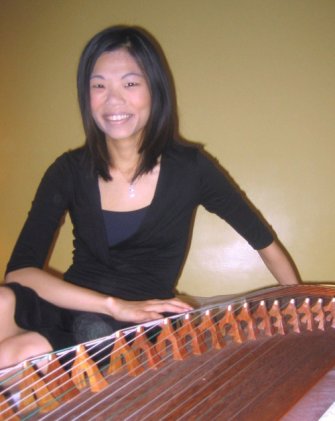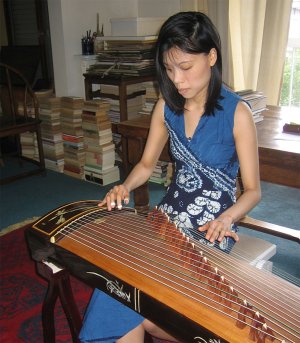Interview with Fiona Lorrain by Karen Rigby
Fiona Lorrain, née Fiona Sze is an artist whose works range from literary creation to music, theatre and curating. An international award-winning pianist and zheng concertist, she also writes poems, plays and critical prose, often under the pen-name Greta Aart. Currently, she is part of the editorial team that heads Emprise Review (www.muttsbane.com). Having spent her years in America, Europe and Southeast Asia, she now lives permanently in Paris, France. (www.fionasze.com)
How do you balance the demands of working in so many mediums? Do you find that you tend to prefer one over another, or find one language easier to express yourself in than another?
‘‘Interdisciplinary’’, ‘‘multidisciplinary’’, ‘‘intercultural’’, ‘‘cross-cultural’’… these are often the words others may use to describe (or label) the kind of work I do, which is in fact true. I write, perform music, engage in theatre work, etc. However, I do believe that being involved in the arts is fundamentally about being a human, and any form of artistic expression is simply a way of dialoguing, or conveying an important message, be it strictly aesthetical, personal or social.
So in a way, it seems bizarre to me that one who writes poetry cannot perform music at a high professional level, or that a theatre artist should be strictly working in the medium of a stage, and no more. Ultimately, it seems to be a question of social fear and security to categorize artists into different disciplines. For the one who seeks a ‘‘way’’ without wanting to stoop low or be constrained by the differences in the disciplines, there is actually a lot of solitude. At the same time, the journey is a non-stop work-in-progress that is highly intense.
I think when you ask about balancing the demands, you are hinting about the various commitments and energies involved in the different disciplines. Yes, in that sense, you are right! When one paints, for instance, he/she obviously would not have the same kind or level of energy as one who writes. For me, playing music is hugely a physical task. There is an intellectual or analytical trajectory in fostering a relationship with the music or instrument, of course. But for some reason—at least in my case—physical vigor is the key to connect head and body to the instrument.
Body is the breathing architecture behind every music. When I am in the midst of a piece of music, there is no mind, only energy, emotions, etc. Even if there is a narrative in the music, the essence of it has usually been long worked through and constructed. Every performance is the same, and different. Freedom for me as a musician actually derives from the something extra that happens between the audience and the performance.
Balancing different art media is about heart, and spirit after all. One who writes good poetry cannot be too banal a musician, especially if he or she is someone who masters the technical aspects. For my case, I try to make sure that at some direct or indirect level, writing informs the music I play, and vice versa. I am no longer that concerned either with technical virtuosity or language brillance, not to say that they aren’t important, but just that the spirit and the subject matter much more to me now.
These days, I do not act any more. In fact, I have stopped acting since my university days in New York. I also direct fewer plays, because I am writing more. Poetry, plays, essays, fiction, etc. Music is also asking more of me in terms of travels.
I must also say that theatre is collective work, a community. Through trials and errors, I have learned that theatre work should best be done when one is solid enough to put the whole self into an intense working relationship with the rest. In theatre, one needs to be immediately responsible for others.
Language–both English and French work fine for me. When I write in English, I think in English. When I write in French, I think in French. Obviously, it isn’t that straightforward. But I tend to appreciate the subtleties in-between, and find them nourishing in the end. Since I live in France, my reality is of course in French. But that should not hinder writing efforts in English, since my native language is English. Further, the instrument I play is of a Chinese heritage.
But I personally do not subscribe to any Chinese thought or practice at all, even though I read Chinese when involved in translation work. I can both understand and appreciate the culture, but I am not an Asian in terms of beliefs or lifestyle. If I am genuinely interested in the pure musical expression of the zheng, I can’t see why languages and cultures would become a baggage instead of an aid. I think it is sad (and impicitly demeaning, too) if one insists that zheng music is ‘‘Chinese music’’, instead of simply ‘‘music’’ with a capital ‘‘M’’.
Your perspective is very interesting — it sounds like being a Renaissance woman (or man).
I believe it is possible for any artist to pursue many avenues. Whether one pursues them at an elite level, that is another issue. Talent does play a role, in that sense. But it would be a serious worry if one who were earnest about his/her craft were less than curious or willing to learn about all other possibilities. I think well-rounded artists, whether accomplished or amateur, are all over the place, actually. To piece together all their different artistic realities, that is the tough bit.
Your interest in the arts — playing the zheng in particular — began at quite a young age. Where did the inspiration come from, and what continues to motivate you?
I started learning the zheng at a very young age after beginning classical piano at the age of 5. Today, I still perform the piano occasionally. Mostly Bach. Zheng is a very little-known musical tradition outside of Asia, and even in Asia today, we often hear complaints of soulless zheng music. I continue to play it in hope of presenting this instrument to unknown audiences beyond its exoticism or orientalism.
I have always wanted to write. I think I knew this when I was seven or eight. But how– that, I didn’t really have much idea (and sometimes even now, too!). My parents are cultured intellectuals now living in Singapore. They were the ones who first gave me learning possibilities in music, because they thought that it would be a good complement to writing. But I don’t think they would have thought that I would want to survive by the arts, because it is a ‘‘hand-to-mouth livelihood’’, to borrow a local expression. I like to believe that one does not ‘‘find’’ artistic expression, but that the latter finds the former.
You’re a writer of critical prose (reviews, essays, reflections on exhibitions in the arts) and also of creative writing. More recently, you’ve become an editor at the literary journal, Emprise Review. Could you speak about any insights that have come from being on both sides of the table?
Emprise Review is a new American literary journal, with a monthly online edition and a forthcoming print anthology. Its editorial team, however, is very international. Our fiction editor, Erin McKnight, is Scottish, and our poetry editor, Karen Rigby, was born in the Republic of Panama, though they both live in the U.S. now, as do the editors-in-chief, Patrick McAllaster and Kris Loveless.
I was attracted to Emprise Review because it is sincere about renewing literary voices, and is willing to take risks. I think in order for a sound literary journal to have its signature, it must first and foremost be able to articulate social statements, explore aesthetics, and most importantly, take the calculated risks in publishing the non-conventional or non-fashioned writings as long as they are writings that can account for things beyond the self. For that to happen, a journal needs to have vision. How? That’s again a question of personality.
Emprise’s editorial staff is made up of volunteers at the moment, but I am very amazed by everyone’s high level of positive energy, and passion. I do feel that I am surrounded by people who would like to survive by literature. They are mostly around my age, but have an atypically dense experience in life and writing. We are spread out around the globe, but we communicate daily and closely.
At the moment, we handle submissions and administrative work, and also generate new editorial work. On my end, for example, I recently contributed a poem, an article on Richard Avedon, and previous essays on Charlie Barnett the street performer and Beckett’s Krapp’s Last Tape. Workload is heavy on all of us, to be honest. So we try to work as a team by helping one another out.
The strength we have is that we all take pride in being writers first, editors second. Writing is about giving and more giving; editing, too, is about giving and more giving. Yes, being part of Emprise does give me the push to submit regularly to other literary journals, and to write more—with a better sensibility and intelligence. And I believe that is the case for my other colleagues.
Sometimes when certain submissions are beyond the scope of what I can understand, it is extremely humbling. And to be frank, certain poets who submit are veteran poets with often important things to share. I feel nowhere, standing next to them. I feel that there is still a lot about writing or editing that I do not know, just like life, I guess. This is also my first time being directly part of an editorial team.
What are some of your current projects?
In terms of writing, the last book publication was Silhouette/Shadow: The Cinematic Art of Gao Xingjian (Paris: Contours, 2007). This book consists of the Nobel Prize Laureate Gao Xingjian’s poetry which I translated from the French, a short critical essay on his film, as well as prose and image contributions from Gao himself and his team in Marseille, Triangle Méditerranée.
Since then, I have been working on a French dissertation on Gao Xingjian’s drama, while preparing a poetry manuscript or chapbook. A couple of these poems have been published in American and English literary reviews, and I thought it might be a good idea to work on a chapbook from there.
Poetry writing is always part of my writing endeavour. I find it hard to let it go.
As for performance, I continue to give regular concerts at museums and performing venues, mostly in Europe. I am also embarking on a CD project with another musician… hopefully this will be done at the end of this year. Usually, I aim for a different blend of repertoire each year. For this performance season, I continue to revisit some classical zheng pieces, while dabbling in new music, adaptations of jazz music, and French popular tunes, as well as Tibetan and Japanese folk songs.













5 comments so far ↓
Nobody has commented yet. Be the first!
Comment